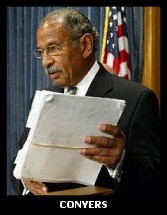 In advance of tomorrow's scheduled U.S. House Judiciary Committee mark-up conference for two Resolutions of Inquiry concerning the NSA's warrantless domestic eavesdropping program, The BRAD BLOG has obtained the statement to be given by the committee's ranking member, Rep. John Conyers (D-MI).
In advance of tomorrow's scheduled U.S. House Judiciary Committee mark-up conference for two Resolutions of Inquiry concerning the NSA's warrantless domestic eavesdropping program, The BRAD BLOG has obtained the statement to be given by the committee's ranking member, Rep. John Conyers (D-MI).
The resolutions (H. Res 643 and 644) direct the Attorney General to submit all documents "relating to warrantless electronic surveillance...of persons in the United States conducted by the National Security Agency" to the Judiciary Committee for review.
As we reported exclusively last Saturday, in an unusual weekend email notification the Dept. of Justice announced to the committee they would be holding a last minute briefing on the program for them on Monday --- in advance of tomorrow's session. That briefing occurred yesterday as scheduled.
In his statement for tomorrow's mark-up conference on the resolutions (audio and video to be broadcast live via the Judiciary Committee website beginning at 10am ET on the web), Conyers explains what his resolution --- supported by 44 members so far --- does and doesn't ask for.
While seeking documentation from the Attorney General, Conyers will explain that the information is not sought "in a conclusory fashion."
"We are not saying that the President broke the law or has acted contrary to the Constitution," according to the congressman, "In fact, this resolution may well produce documents that rebut those allegations."
He points out that many of "the Nation's most preeminent legal and intelligence authorities," from both sides of the political aisle, have questioned the constitutionality of the program, and that even the Dept. of Justice, in last Monday's briefing, admitted that "some of the legal questions involved here are close calls."
Conyers goes on to laud the chair of the committee, Rep. James Sensenbrenner (R-WI), for his recent letter sent to the AG requesting answers to 51 questions about the program. He adds, however, that other committee members have questions they'd like answered as well. Conyers' asks that those other members would also appreciate having their questions forwarded to the Dept. of Justice on behalf of the committee.
The congressman concludes by reaching out to both sides of the aisle:
"It is time that Congress begins to serve as a genuine check and balance on the Administration. This is not a partisan issue, to me it's a constitutional issue, and I urge my colleagues on both sides of the aisle to help us, before its too late."
John Conyers' complete statement for tomorrow's conference follows in its entirety...
I urge my colleagues to support my resolution of inquiry, which has been cosponsored by 44 individuals, including every single Democrat on this Committee,
First, let me make clear what materials this Resolution is requesting. It simply asks the Attorney General to submit all documents in his possession relating to warrantless electronic surveillance of telephone conversations and electronic communications of persons in the United States conducted by the National Security Agency, subject to necessary redactions or requirements for handling classified documents. This request would include any and all opinions regarding warrantless electronic surveillance of telephone conversations and electronic communications of persons in the United States, as well as other records which would allow us to better understand the size, scope, and nature of the program.
Second, I want to explain why we are asking for this information. We are not asking for this information in a conclusory fashion. We are not saying that the President broke the law or has acted contrary to the Constitution. In fact, this resolution may well produce documents that rebut those allegations. What is clear is that, assuming what has been reported is true, many Constitutional and legal experts - Republicans and Democrats - have indicated that this secret domestic surveillance program raises substantial questions about whether the program is legal and whether it is constitutional.
These include the Nation's most preeminent legal and intelligence authorities: (1) Harvard Professor Laurence Tribe; (2) 14 of the nations preeminent legal scholars, including William S. Sessions, the former Director of the FBI under Presidents Ronald Reagan, George H.W. Bush and Bill Clinton, and William W. Van Alstyne, a Law Professor at William and Mary who was a witness called by this Committee's Republican Members during the impeachment of President Clinton; (3) Bruce Fein, a former Deputy Associate Attorney General in the Reagan Administration, (4) Jonathan Turley, a Constitutional scholar and another witness called by the Republicans on this Committee during the Clinton impeachment, and (5) the non-partisan Congressional Research Service.
The question before us is not whether you agree or disagree with these individuals, but whether you think their judgments are sufficiently serious to warrant further inquiry by this Committee. I would also add that the Justice Department, when it briefed staff on Monday, indicated that some of the legal questions involved here are close calls.
Third, if you agree that this warrants further inquiry, the question is what kind of action this Committee should take?
I commend the Chairman for sending a letter to the Attorney General asking questions about this program. Many of us have questions of our own and I hope the Chairman will forward them to the Attorney General and ask that they be answered with the same speed.
Questions alone - which can be ignored or danced around - are not sufficient. This Committee has always taken the common sense approach that the best way to find out what people were thinking at the time they made decisions, is to get the documents they wrote at that time reflecting those thoughts. In fact, on a number of matters - including biometric passports, judicial sentencing practices, the Civil Rights Commission, and Legal Service Commission - the Chairman's first step has been to obtain and preserve relevant documents.
The Washington Post has written, that the Executive Branch treats Congress "as an annoying impediment to the real work of government. It provides information to Congress grudgingly, if at all. It handles letters from lawmakers like junk mail, routinely tossing them aside without responding."
It is time that Congress begins to serve as a genuine check and balance on the Administration. This is not a partisan issue, to me it's a constitutional issue, and I urge my colleagues on both sides of the aisle to help us, before its too late.


 Trump Gets Trumped in Our Musky Year-End Roundtable: 'BradCast' 12/19/24
Trump Gets Trumped in Our Musky Year-End Roundtable: 'BradCast' 12/19/24 'Green News Report' 12/17/24
'Green News Report' 12/17/24
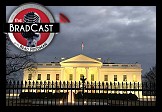 About Some of Trump's
About Some of Trump's Trump Family Corruption Cometh...So Does Our Oppo-sition: 'BradCast' 12/17/24
Trump Family Corruption Cometh...So Does Our Oppo-sition: 'BradCast' 12/17/24 'Green News Report' 12/17/24
'Green News Report' 12/17/24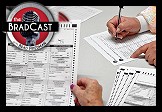 Mistallied Contests Found in OH County, as Oligarchy Rises in D.C.: 'BradCast' 12/16/24
Mistallied Contests Found in OH County, as Oligarchy Rises in D.C.: 'BradCast' 12/16/24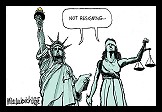 Sunday 'Barrel Bottom' Toons
Sunday 'Barrel Bottom' Toons Trump Admits He Can't Lower Grocery Prices (Biden Just Did): 'BradCast' 12/12/24
Trump Admits He Can't Lower Grocery Prices (Biden Just Did): 'BradCast' 12/12/24 'Green News Report' 12/12/24
'Green News Report' 12/12/24 What 'Unprecedented and Powerful Mandate'?: 'BradCast' 12/11/24
What 'Unprecedented and Powerful Mandate'?: 'BradCast' 12/11/24 Trump Barely Won Nationally, But Won 'News Deserts' By a Landslide: 'BradCast' 12/10
Trump Barely Won Nationally, But Won 'News Deserts' By a Landslide: 'BradCast' 12/10 'Green News Report' 12/10/24
'Green News Report' 12/10/24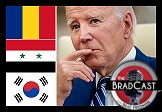 Bad Weekend for Authorit-arianism; Also: To Pardon or Not?: 'BradCast' 12/9/24
Bad Weekend for Authorit-arianism; Also: To Pardon or Not?: 'BradCast' 12/9/24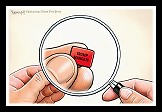 Sunday 'Teeny Tiny' Toons
Sunday 'Teeny Tiny' Toons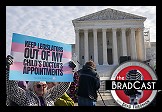 Fox 'News' and GOP Get Their Hateful War on Trans Kids at SCOTUS: 'BradCast' 12/5/24
Fox 'News' and GOP Get Their Hateful War on Trans Kids at SCOTUS: 'BradCast' 12/5/24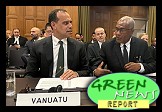 'Green News Report' 12/5/24
'Green News Report' 12/5/24 'Mind Boggles at Potential Corruption' in Trump Scheme: 'BradCast' 12/4/24
'Mind Boggles at Potential Corruption' in Trump Scheme: 'BradCast' 12/4/24 In Defense of Democracy from S. Korea to N. Carolina: 'BradCast' 12/3/24
In Defense of Democracy from S. Korea to N. Carolina: 'BradCast' 12/3/24 Hunter's Pardon: 'BradCast' 12/2/24
Hunter's Pardon: 'BradCast' 12/2/24 How (and Why!) to 'Extend Olive Branch' to MAGA Members: 'BradCast' 11/21/24
How (and Why!) to 'Extend Olive Branch' to MAGA Members: 'BradCast' 11/21/24 Former Prosecutor: Sentence Trump in NY Before Taking Office: 'BradCast' 11/20/24
Former Prosecutor: Sentence Trump in NY Before Taking Office: 'BradCast' 11/20/24 'Bullet Ballot' Claims, Other Arguments for Hand-Counting 2024: 'BradCast' 11/19/24
'Bullet Ballot' Claims, Other Arguments for Hand-Counting 2024: 'BradCast' 11/19/24 Trump Already Violating Law During Transition: 'BradCast' 11/18/24
Trump Already Violating Law During Transition: 'BradCast' 11/18/24 Computer Experts Ask Harris to Seek Hand-Counts After Breaches: 'BradCast' 11/14/24
Computer Experts Ask Harris to Seek Hand-Counts After Breaches: 'BradCast' 11/14/24
 VA GOP VOTER REG FRAUDSTER OFF HOOK
VA GOP VOTER REG FRAUDSTER OFF HOOK Criminal GOP Voter Registration Fraud Probe Expanding in VA
Criminal GOP Voter Registration Fraud Probe Expanding in VA DOJ PROBE SOUGHT AFTER VA ARREST
DOJ PROBE SOUGHT AFTER VA ARREST Arrest in VA: GOP Voter Reg Scandal Widens
Arrest in VA: GOP Voter Reg Scandal Widens ALL TOGETHER: ROVE, SPROUL, KOCHS, RNC
ALL TOGETHER: ROVE, SPROUL, KOCHS, RNC LATimes: RNC's 'Fired' Sproul Working for Repubs in 'as Many as 30 States'
LATimes: RNC's 'Fired' Sproul Working for Repubs in 'as Many as 30 States' 'Fired' Sproul Group 'Cloned', Still Working for Republicans in At Least 10 States
'Fired' Sproul Group 'Cloned', Still Working for Republicans in At Least 10 States FINALLY: FOX ON GOP REG FRAUD SCANDAL
FINALLY: FOX ON GOP REG FRAUD SCANDAL COLORADO FOLLOWS FLORIDA WITH GOP CRIMINAL INVESTIGATION
COLORADO FOLLOWS FLORIDA WITH GOP CRIMINAL INVESTIGATION CRIMINAL PROBE LAUNCHED INTO GOP VOTER REGISTRATION FRAUD SCANDAL IN FL
CRIMINAL PROBE LAUNCHED INTO GOP VOTER REGISTRATION FRAUD SCANDAL IN FL Brad Breaks PA Photo ID & GOP Registration Fraud Scandal News on Hartmann TV
Brad Breaks PA Photo ID & GOP Registration Fraud Scandal News on Hartmann TV  CAUGHT ON TAPE: COORDINATED NATIONWIDE GOP VOTER REG SCAM
CAUGHT ON TAPE: COORDINATED NATIONWIDE GOP VOTER REG SCAM CRIMINAL ELECTION FRAUD COMPLAINT FILED AGAINST GOP 'FRAUD' FIRM
CRIMINAL ELECTION FRAUD COMPLAINT FILED AGAINST GOP 'FRAUD' FIRM RICK SCOTT GETS ROLLED IN GOP REGISTRATION FRAUD SCANDAL
RICK SCOTT GETS ROLLED IN GOP REGISTRATION FRAUD SCANDAL VIDEO: Brad Breaks GOP Reg Fraud Scandal on Hartmann TV
VIDEO: Brad Breaks GOP Reg Fraud Scandal on Hartmann TV RNC FIRES NATIONAL VOTER REGISTRATION FIRM FOR FRAUD
RNC FIRES NATIONAL VOTER REGISTRATION FIRM FOR FRAUD EXCLUSIVE: Intvw w/ FL Official Who First Discovered GOP Reg Fraud
EXCLUSIVE: Intvw w/ FL Official Who First Discovered GOP Reg Fraud GOP REGISTRATION FRAUD FOUND IN FL
GOP REGISTRATION FRAUD FOUND IN FL


































